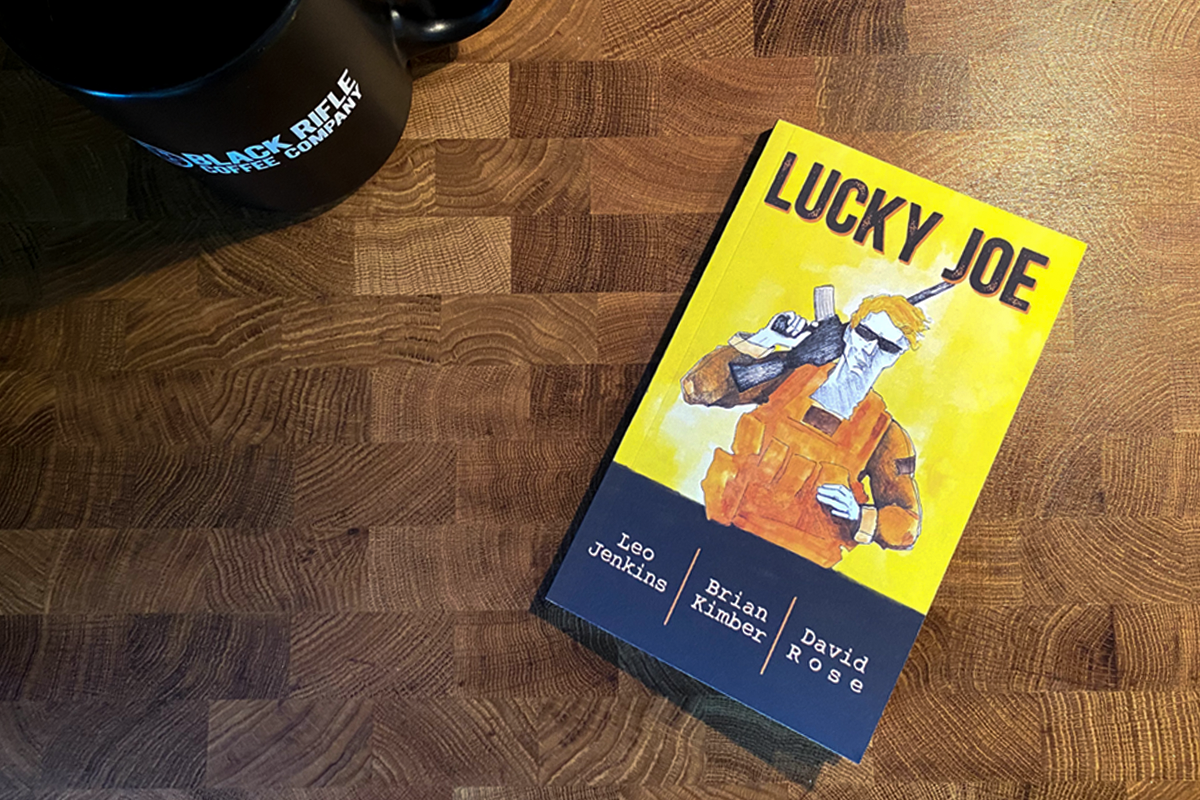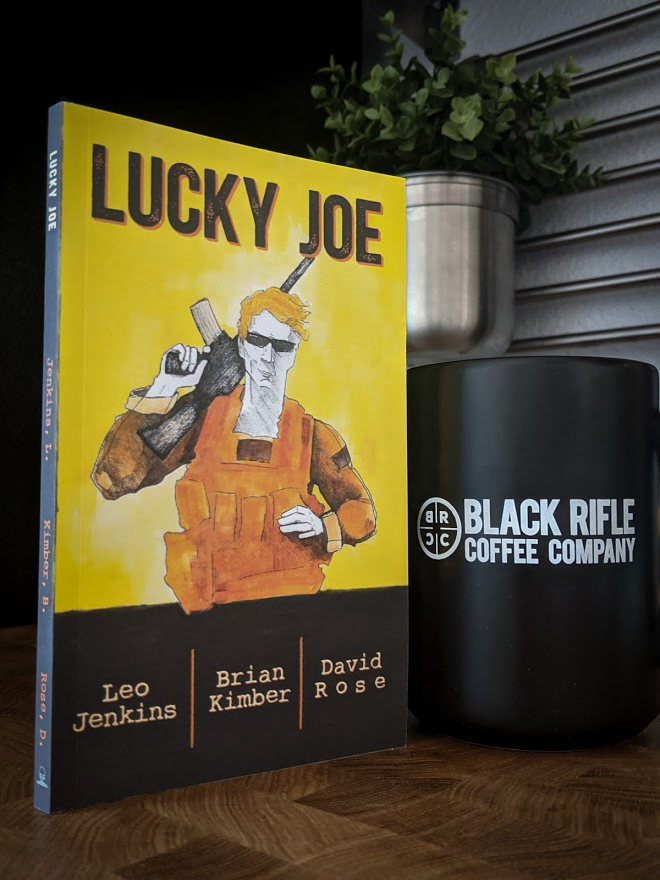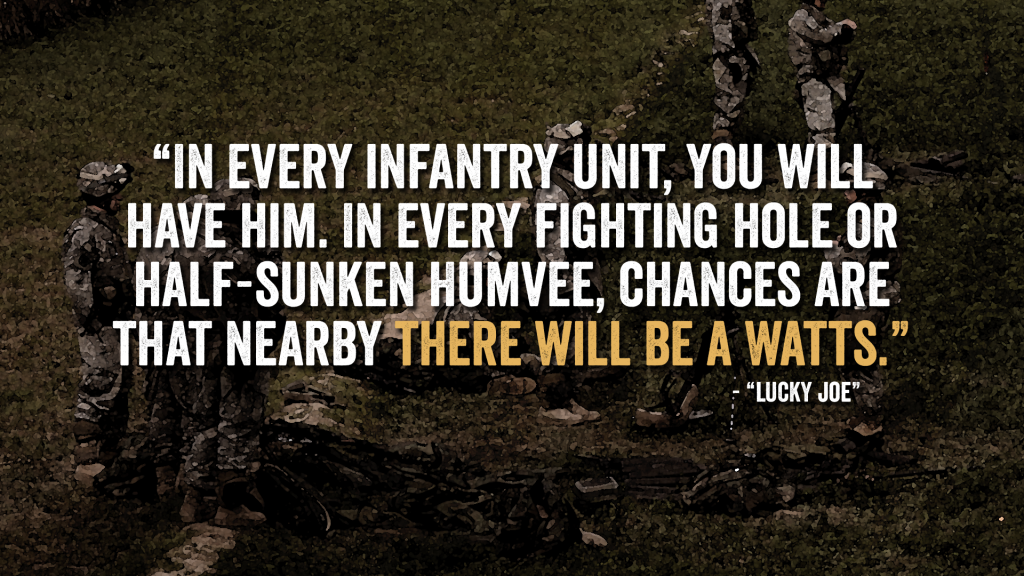‘Lucky Joe’: The Compelling Story of the Guy Scrawling Profanities on a FOB Port-a-Potty

Authors Leo Jenkins, Brian Kimber, and David Rose have teamed up under the veteran-owned publishing company Dead Reckoning Collective to paint a picture. The picture is not of a battle-hardened Delta operator hunting down Taliban leadership, and it’s not of the humble and good-hearted soldier who struggles with post-traumatic stress (PTS) and reintegration into society after a heartbreaking deployment.
No, this picture illustrates “that guy.” The guy whose usage of profanity has been perfected to an art form, the guy who no one in the platoon can stomach, and the guy who, from day one, condemned himself to a career full of reprimands and earfuls from higher-ranking soldiers. In this book, his name is Joe Watts — though if you served, you probably have another name for him.
Oh, and he’s not a terribly good soldier, but he’s not a terribly bad one either. He’s just Joe Watts.
The novella Lucky Joe centers around three men who served with Watts and have arrived at the crude man’s funeral, a shoddy event at which they are the only attendees. They reminisce about Watts, their experiences with him, and their experiences at war in general.
Lucky Joe isn’t just a series of humorous, tongue-in-cheek events (though those do appear). It’s a sincere look at what it means to be a regular service member in today’s Global War on Terror. It explores the complexities of the war many have overlooked when homing in on the fiery moments of combat and the funerals that follow.
And yet, the moments described in Lucky Joe are extremely accurate to the modern wartime experience. These are the stories you don’t typically hear, the stories of the huge stretches of time between those firefights and explosions. There are bouts of gunfire and detonations of IEDs in this book, sure, but the heart of Lucky Joe is with the men scraping around in the dust and what that scraping looks like. It follows their struggles with a disappointing war (and what that even means), missions they don’t fully understand, at odds with people they don’t fully understand either.

Anyone who has deployed to Afghanistan or Iraq knows that the war is not this generation’s world war or Vietnam — it’s a beast of its own. There have been battles that would shake the foundation of any warrior, but there have also been years and years of awkward maneuvering punctuated by small bursts of violence, taking its toll on those who were present and strangely affecting those who were nearby … leaving everyone simply having to carry on until the next.
It’s very likely that there are more service members who have deployed without firing their weapon in combat than haven’t, and sometimes that even includes infantrymen. And yet, whether the ordeal was chock-full of gunfights or thumb-twiddling — or the common middle ground between the two — it always seems to make the spirit restless.

It’s a difficult affair to describe, in all its intensity and monotony, but thankfully, I don’t have to — Lucky Joe illustrates the GWOT experience succinctly. It doesn’t seek to explain all of those complexities; rather, it dives headfirst into them and paints them as clearly as one can. They are (often humorously) depicted through the character himself, Joe Watts.
“The memory of those mountains, those God-like spires ascending to and piercing the heavens, the rugged taunting allure of their majesty, the fatality of their treacherous sheer cliffs, and Joe Watts, pants around his ankles, bare white ass in the Afghan sun, pissing from one of their peaks while looking back over his shoulder with chipped Cheshire grin, was a memory tattooed on the mind’s eye of Joey ‘Doc’ Preston.”
Lucky Joe, by Leo Jenkins, Brian Kimber, and David Rose, Dead Reckoning Collective, 125 pages, $25. Available on Amazon; signed copies are available for preorder at Dead Reckoning Collective. Release date: Dec. 12, 2020.

Luke is the author of two war poetry books, The Gun and the Scythe and A Moment of Violence, and a post-apocalyptic novel, The First Marauder. He grew up in Pakistan and Thailand as the son of aid workers. Later, he served as an Army Ranger and deployed to Afghanistan on four combat deployments. Now he owns and operates Four Hawk Media, a social media-focused marketing company.
BRCC and Bad Moon Print Press team up for an exclusive, limited-edition T-shirt design!
BRCC partners with Team Room Design for an exclusive T-shirt release!
Thirty Seconds Out has partnered with BRCC for an exclusive shirt design invoking the God of Winter.
Lucas O'Hara of Grizzly Forge has teamed up with BRCC for a badass, exclusive Shirt Club T-shirt design featuring his most popular knife and tiomahawk.
Coffee or Die sits down with one of the graphic designers behind Black Rifle Coffee's signature look and vibe.
Biden will award the Medal of Honor to a Vietnam War Army helicopter pilot who risked his life to save a reconnaissance team from almost certain death.
Ever wonder how much Jack Mandaville would f*ck sh*t up if he went back in time? The American Revolution didn't even see him coming.
A nearly 200-year-old West Point time capsule that at first appeared to yield little more than dust contains hidden treasure, the US Military Academy said.













